communities & scientists working together for
environmental justice
activities
events
PLM and Cartong collaboration mapathon event:
As part of the GeoNight, CartONG (French NGO specialized in Information Management and mapping for humanitarian and development sectors) coordinates several mapathons with organizations like yours in France and abroad. In 2019, 17 mapathons took place for GeoNight, gathering more than 500 mappers. You can find here a webmap of the events.
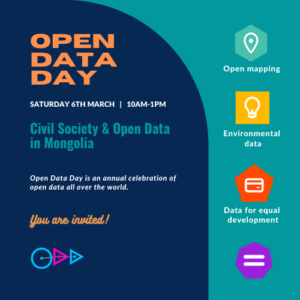 March 6th is the international Open Data Day! On this day, we are inviting participants from the local civil society interested in contributing or learning about open data, tools and resources using OSM (Open Street Map). The event will have a short introduction on open data, followed by discussion sessions with participating civil society members in topics including environmental data, tracking public money flows, and data for equal development. Finally, training on open data mapping will be provided so that participants can contribute remotely by mapping the ger district infrastructure in Ulaanbaatar.
March 6th is the international Open Data Day! On this day, we are inviting participants from the local civil society interested in contributing or learning about open data, tools and resources using OSM (Open Street Map). The event will have a short introduction on open data, followed by discussion sessions with participating civil society members in topics including environmental data, tracking public money flows, and data for equal development. Finally, training on open data mapping will be provided so that participants can contribute remotely by mapping the ger district infrastructure in Ulaanbaatar.
Watch live event HERE.
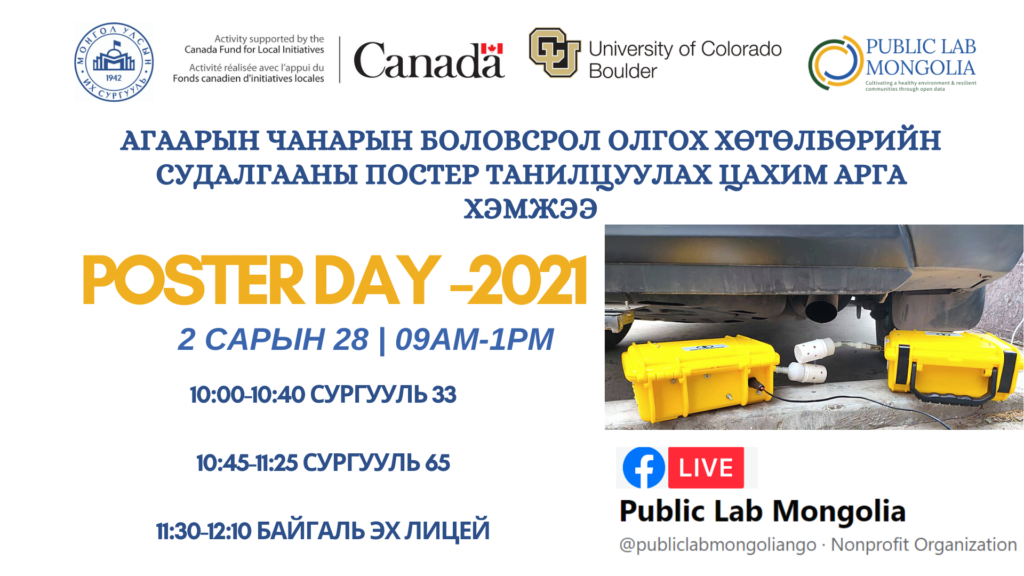 WHAT IS AQIQ program?
WHAT IS AQIQ program?
AQIQ /Air Quality Air Inquiry Program/ is an international youth program on air quality education based on STEM curriculum. Students participating in the program carry out air quality experiments and independent research projects. The 2020-2021 AQIQ program is being successfully implemented in three high schools in Ulaanbaatar, involving 6 university mentors and 60 high school students, by Public Lab Mongolia, in partnership with the National University of Mongolia and the University of Colorado Boulder, with support from the Canada Fund.
What is poster day? Program participants conducted their own air quality research projects using “Pod” – a new age monitoring devices. The poster day aims to raise awareness about air quality among participating students peers and communities by each team of high school students present their research posters during the event. Total of 12 research projects will be presented.
Watch live event HERE.
Projects
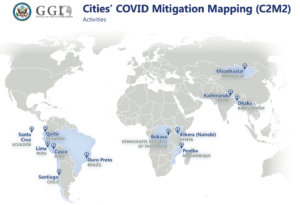 The COVID-19 pandemic has rapidly spread around the world affecting public health and having cascading impacts on nearly every aspect of human life. Challenges from COVID-19 extend far beyond the illness, to include disruption of the global economy and local socio-economic relationships.
The COVID-19 pandemic has rapidly spread around the world affecting public health and having cascading impacts on nearly every aspect of human life. Challenges from COVID-19 extend far beyond the illness, to include disruption of the global economy and local socio-economic relationships.
The COVID-19 pandemic will continue to challenge vulnerable populations and communities long after the infection numbers peak. Many vulnerable populations around the world are experiencing a new complexity the virus is bringing to existing challenges such as poverty, food insecurity, obstacles to social, economic, and labor mobility, and access to education. Understanding these second-order impacts will help officials as well as civil society organizations mitigate negative effects and strengthen responses to address growing economic, health, and education needs.
The Cities’ COVID Mitigation Mapping program (C2M2) builds on global networks of geospatial experts to analyze second-order impacts of COVID-19. The goal of this program is to increase the capacity to understand the distribution and gaps in resources available to vulnerable populations in urban communities. This program has three regional hubs in Africa, Asia, and Latin America, where select local organizations, with regional geospatial and community development expertise, identify and work with various local project partners to develop and guide C2M2 projects in each region.
C2M2 projects build local capacity to utilize open data and geospatial technologies, strengthen international partnerships, and create new data and analyses to inform data-driven decision making for planning to mitigate COVID-19 second-order impacts. Project partners will focus on key themes: food security, informal economy, tourism, health, and mobility to address second-order impacts of COVID-19.
More information about project: https://mapgive.state.gov/c2m2/
Covid-19 cases in Mongolia: https://covid19mongolia.mn/, https://covid19.mohs.mn/
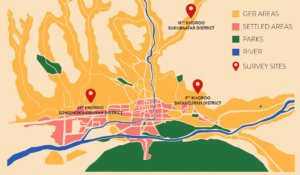 ‘Unaa’ means ‘a ride’ in Mongolian. UNAA also stands for the Ulaanbaatar Accessibility Appraisal, a multinational research and idea generating project examining social equity and mobility, exploring access barriers faced by residents of Ulaanbaatar’s Ger areas.
‘Unaa’ means ‘a ride’ in Mongolian. UNAA also stands for the Ulaanbaatar Accessibility Appraisal, a multinational research and idea generating project examining social equity and mobility, exploring access barriers faced by residents of Ulaanbaatar’s Ger areas.
Ulaanbaatar’s Ger areas are home to over half of the city’s 1.5 million residents. As well as lacking in basic transport infrastructure and, in many places, effective urban planning, Ger area residents face the additional challenges of an extreme climate, with winter temperatures regularly plunging to -40 C. Majority of residents do not have cars, and most access tracks are narrow, steep and are unsuitable for upgrading to cater for buses and other public transport services. Many residents have challenges accessing safe and efficient access to the core functions of the city. The aims of UNAA are to understand how Ger area residents travel, to build evidence on the types of access residents face and develop sustainable and resilient approaches to address the discrepancy in levels of access.
More info: https://www.unaa-project.org
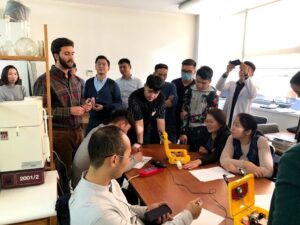 Air pollution continues to be a severe public health challenge in Mongolia. Many initiatives to address air pollution has been at policy, business, academia or research levels. Children, among those most impacted, are one of the most vulnerable populations. We believe youth are a key stakeholder and have an important seat and role in air quality dialogue. Young people are not only our future decision-makers, but also key change agents for their communities. However, awareness raising activities specifically for young people have been very few, if at all, and no direct engagement exists to involve the youth in air quality dialogue. Youth engagement in addressing the air quality challenges is an important gap that needs to be filled.
Air pollution continues to be a severe public health challenge in Mongolia. Many initiatives to address air pollution has been at policy, business, academia or research levels. Children, among those most impacted, are one of the most vulnerable populations. We believe youth are a key stakeholder and have an important seat and role in air quality dialogue. Young people are not only our future decision-makers, but also key change agents for their communities. However, awareness raising activities specifically for young people have been very few, if at all, and no direct engagement exists to involve the youth in air quality dialogue. Youth engagement in addressing the air quality challenges is an important gap that needs to be filled.
WHAT IS AQIQ program?
AQIQ /Air Quality Air Inquiry Program/ is an international youth program on air quality education based on STEM curriculum. Students participating in the program carry out air quality experiments and independent research projects. The program goal is to foster Mongolian youth leadership in air quality dialogue via hands-on, experiential air quality education. The program promotes an active engagement and leadership among young people who are interested in getting involved in air quality issues but lack the necessary tools or know-how, by equipping them with the technology, mentorship and resources.
The program works with University of Colorado Boulder, National University of Mongolia, and selected high schools with goals of educating Mongolian youth about air quality issues and related science and technology, along with nurturing dispositions to steward their environment.
The 2020-2021 AQIQ program is being successfully implemented in three high schools in Ulaanbaatar, involving 6 university mentors and 60 high school students, by Public Lab Mongolia, in partnership with the National University of Mongolia and the University of Colorado Boulder, with support from the Canada Fund.
Watch Poster Day Event recording HERE.
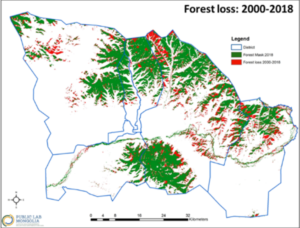 Mongolia’s forest resource is not very rich in extent or quality, covering an area of 17.5 million ha on the southernmost fringe of the Great Siberian forest and some mountain ranges in the western and northwestern part of the Mongolian territory. Closed forests occupy only 8.1% of the land area of Mongolia. The location and quality of forest varies greatly throughout the country.
Mongolia’s forest resource is not very rich in extent or quality, covering an area of 17.5 million ha on the southernmost fringe of the Great Siberian forest and some mountain ranges in the western and northwestern part of the Mongolian territory. Closed forests occupy only 8.1% of the land area of Mongolia. The location and quality of forest varies greatly throughout the country.
Population increases have led to an ever–increasing demand for forest products, with logging, forest fires and pests progressively depleting the forest cover (Tsogtbaatar 2004). Mongolia’s forests are vitally important for both local community livelihood and businesses that rely on timber and other timber products.
The remote-sensing techniques and satellite data can now be used to determine the distribution of forest vegetation throughout the world. The use of remote sensing is now accessible for not only experts, but also a larger number of stakeholders who can take advantage of the growing possibilities of this technique.
Within the scope of the UNESCAP project, the forested areas surrounding the Ulaanbaatar city was mapped and up-to-date digital database of the forested areas was generated for the use of local authorities to monitor and protect these areas. The purpose of this study was to prepare a forest cover health assessment map of the Ulaanbaatar green forest zone and to make overlay analysis with UB city settlement and Special Protected area. It is important to assess how is the current of UB forest cover health condition and to determine where are most of the vulnerable area for illegal logging.
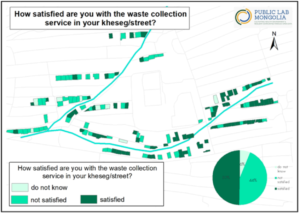 The Arts Council of Mongolia is implementing a project Reimagine Ulaanbaatar, as part of the Ger Area Redevelopment Plan, a long-term urban development joint project carried out by the Municipality of Ulaanbaatar city, and the Asian Development Bank.
The Arts Council of Mongolia is implementing a project Reimagine Ulaanbaatar, as part of the Ger Area Redevelopment Plan, a long-term urban development joint project carried out by the Municipality of Ulaanbaatar city, and the Asian Development Bank.
The Reimagine Ulaanbaatar a community outreach project is implemented in Bayankhoshuu sub center, one of the 5 subcenters of the larger ger area redevelopment project. Bayankhoshuu subcenter is in Songino-Khairkhan district, across khoroos 9, 10, and 28.
The Bayankhoshuu sub center has a flood dam that runs through the area, and the dam has been renovated with better structural integrity and pedestrian bridges for residents in the area to cross over the flood dam. Despite improvements in the dam, and other redevelopment initiatives in the subcenter target area, solid waste management issue continues to be an issue, particularly in connection to the flood dam.
In order to better understand the context of the solid waste management issue in the select subcenter, and strategize future outreach activities for community members, Public Lab Mongolia to carried out a solid waste management assessment and provided recommendations based on engagement with local community members and relevant stakeholders.
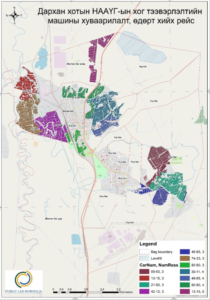 Mapping Secondary Cities for Resiliency, Human Security and Emergency Preparedness Program (2C) in Darkhan
Mapping Secondary Cities for Resiliency, Human Security and Emergency Preparedness Program (2C) in Darkhan
The Asia Foundation, in partnership with Public Lab Mongolia, with support from the U.S Embassy in Mongolia, implemented a Secondary Cities project starting in October 2018. The overall goal of the project was to support local capacity for geospatial data collection and evidence-based urban planning. The project aims to:
(i) strengthen the capacity of local teachers, professors, and students to develop a geospatial database;
(ii) create a database of key indicators for solid waste management;
iii) support the use of data to inform urban planning and fact-based decision-making with an initial focus on solid waste.
The project focused on solid waste issues, including trash collection and illegal dumpsites, for data collection and analysis, with a goal to improve solid waste management in Darkhan city of Mongolia.
Our team has worked on a number of interesting and challenging projects in the past in partnership with local and international organizations. Short summaries below:
1. Climate change perception of local community in Mongolia: a participatory visual study aimed at informing local government and stakeholders and raise awareness about real-life impact of climate change in rural communities; (implementing organization: GERES in Mongolia)
2. Urban migrant vulnerability analysis: a participatory study to identify challenges faced by new urban migrants in Ulaanbaatar, aimed at informing capital city and national agencies and provide recommendations to reduce urban migrant vulnerabilities; (implementing organization: UN International Organization of Migration in Mongolia)
3. Visualizing air pollution levels along children’s school-work commute to promote youth participation and awareness in air quality issues via individual stories of commuting in polluted air; (implementing organization: US Embassy in Mongolia)
4. Tracking public money flows: mapping the spending of participatory budget spending by location, projects, and amount spent to provide transparency and awareness to improve public participation and decision-making in participatory budget spending; (implementing organization: The Asia Foundation in Mongolia)
Opportunities
Internship
volunteer
We are looking for an intern to work on communication tasks, including managing social media accounts, creating content based on programs and projects.
We are looking for program intern to assist with ongoing programs and compile research related to environment and public health sectors.
If you are interested in volunteering with us, send us an email with your Resume and a few sentence on what activities you would like to get involved.
